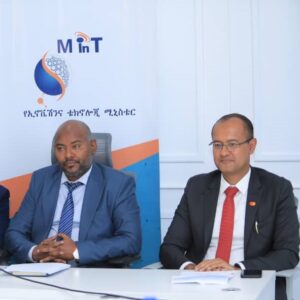
The Ministry of Innovation and Technology (MINT), Mastercard, and Commercial Bank of Ethiopia have partnered to enable payments through the government e-services portal, which will allow Ethiopians to access and pay for government services digitally for the first time. This supports the government’s wider digital transformation plan to modernize Ethiopia’s payment systems and foster a more financially inclusive ecosystem.
The partnership will see Mastercard integrate its Payment Gateway Services (MPGS) infrastructure into Commercial Bank of Ethiopia, which will enable payment collection on behalf of the government. As part of the first phase, members of the Civil Society Organization of Ethiopia will soon be able to pay for their operational licenses on the portal with any branded payment card. This is the first of many use cases that will be offered through the portal, which will act as a one-stop gateway for citizens and organizations to access and pay for government services.
The integration of the e-services portal with MPGS follows the Memorandum of Understanding signed between MINT and Mastercard in 2020 to digitize payments and enhance service delivery to citizens in line with Ethiopia’s Digital Transformation Strategy known as ‘Digital Ethiopia 2025’.
“Our efforts will further relieve Ethiopia of the cost of cash and support our ambitious digital transformation strategy. Partnering with trusted global companies like Mastercard ensures that we can develop an innovative payment infrastructure to facilitate digital interactions between the government and our citizens. We want to empower our citizens using innovative technology and offering a selection of digital payments options is a key part of achieving that goal,” says His Excellency Belete Molla, Minister for the Ministry of Innovation and Technology. “Partnering with Mastercard enables us to provide a versatile digital payments solution – customers with any bank card can use it. That means people can pay conveniently and safely wherever they are and at any time. It also enables us to improve revenue collection and achieve efficiencies—in turn, freeing up resources to improve service delivery.”
“By supporting the Ethiopian government in the implementation of a world-class and innovative digital payments platform, we are collaborating to save resources, increase efficiencies, and deliver improved services to citizens. Soon, members of the Civil Society Organization will no longer need to carry cash, travel long distances, and stand in long queues at banks to pay for their licenses. Rather, they will be able to do it safely and conveniently online,” says Mark Elliott, Division President, Mastercard, Sub-Saharan Africa.
In Ethiopia, there has historically been a heavy reliance on cash, with the majority of retail transactions taking place in cash. While seemingly inexpensive, cash comes at a high economic cost, which Mastercard estimates to be between 3.2% and 4.5% of GDP. According to the latest Global Findex Database, only 35% of Ethiopian adults have accounts from a formal financial institution. Without access to financial services, many people are locked out of many economic activities and have very limited financial choices. Digitising payments can further support financial inclusion and deliver more sustainable and inclusive economic growth.
The automation and digitisation of government collections will accelerate Ethiopia’s transition to a cash-lite society. Person to Government (P2G) and Business to Government (B2G) use cases such as enabling civil society payments will enable faster adoption of digital payments, given these capture a number of high-frequency payments.
Mastercard is leveraging its technology, digital assets, and services to support Ethiopia in achieving its digital transformation objectives. This includes strengthening Mastercard’s innovative solutions and digital platforms to support and drive financial inclusion and promoting access to, and usage of electronic payments. This further supports Mastercard’s goal of including 1 billion people and 50 million micro and small businesses into the digital economy by 2025.
“We are deeply committed to supporting the government to achieve its Digital Ethiopia 2025 strategy. Through our partnership with MINT, we aim to create an inclusive, digital economy that benefits everyone, everywhere by making transactions safe, simple, smart and accessible,” says Elliott.



